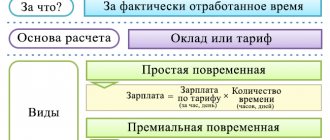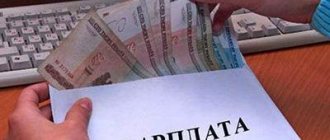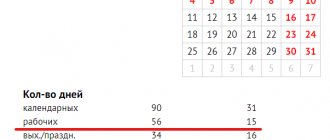What is salary indexation
The definition of the concept of “wage indexation” is disclosed in Art. 134 Labor Code of the Russian Federation. Here, indexation means an increase in employee wages due to rising consumer prices for goods and services.
State bodies, local governments, state and municipal institutions index the salaries of their employees in the manner established by labor legislation. All other employers, including commercial organizations and individual entrepreneurs, increase salaries in the manner established by the collective agreement, agreements, and local regulations.
Cheat sheet on the article from the editors of BUKH.1S for those who do not have time
1. Wage indexation - an increase in employee wages due to rising consumer prices for goods and services.
2. Salaries should be indexed once a year. The legislation does not establish uniform indexation periods.
3. All employers without exception are required to index employee salaries, regardless of the presence or absence of an indexation provision in the organization.
4. The Labor Code of the Russian Federation does not provide for any requirements for the procedure for indexing salaries of employees of commercial organizations. Therefore, employers who do not receive budget funding have the right to choose any indexation procedure and conditions.
5. If the employer does not index the salaries of employees, he will be held administratively liable. The fines are quite high - up to 50,000 rubles.
6. Nobody prohibits the employer from using other means of increasing the level of real wages, except for indexation. For example, give bonuses to employees or periodically increase official salaries.
Salaries are indexed once a year. The legislation does not establish uniform indexation periods.
As a general rule, indexation is carried out from the moment when Rosstat determines the inflation rate for the entire past calendar year. This moment falls on February 1st of every year. But employers can index salaries from another date. For example, from January 1 or from the second half of the year.
THE MINIMUM WAGE IS RISING—SALARY IS RISING
From January 1, 2021, the minimum wage in the country will be 11 thousand 200 rubles. The increase was planned in view of the government decree to equalize the level of the minimum wage and the cost of living in the country as soon as possible. Even a slight increase in the minimum wage affects the growth of wages among the population, including public sector employees, which means that there will definitely be an increase in wages in 2021.
About five billion rubles will be allocated from the state budget for the needs of the regions regarding the costs of raising wages. The date for the salary increase has not yet been announced.
By the way, pensions and unemployment benefits will increase in the country in 2021 - these needs will be paid for by the Pension Fund together with the state due to the adoption of a new pension reform. Pensions will increase by a thousand rubles on average. And the benefit for the unemployed will be 1.9 - 8 thousand rubles, depending on the region of residence of the person applying to the employment center and his “labor history”.
Who is obliged to index salaries?
Absence in Art. 134 of the Labor Code of the Russian Federation, a clear procedure for indexing salaries leads to the fact that a number of commercial organizations do not increase the salaries of their employees at all.
At the same time, they refer to this same article, which states that employers carry out indexation in the manner established in the collective agreement or other local act. Accordingly, in their opinion, if a local act does not contain a provision on indexation, then it is not necessary to carry it out.
In fact, this point of view is wrong. This has been repeatedly recognized by the Constitutional Court (decision of the Constitutional Court of the Russian Federation of November 19, 2015 No. 2618-O, determination of July 17, 2014 No. 1707-O).
The court explained that the Labor Code of the Russian Federation does not allow an employer not related to the public sector to deprive employees of the right to a salary increase. Nor does it allow one to evade the establishment of wage indexation. Therefore, when formalizing an employment relationship, the employer must negotiate with the employee the procedure for increasing his salary. The procedure for indexing wages is determined in a collective agreement, agreement or any other local regulatory act.
At the end of 2021, Rostrud warned employers that the absence of a salary indexation provision in an organization does not exempt the employer from such indexation. If at the end of the year Rosstat recorded an increase in consumer prices, and the employer did not index salaries, he will be fined. If the employer did not approve the indexation provision, he will be obliged to do so.
The Ministry of Labor also recalled the indexation of wages in 2021, clarifying that the employer is obliged to ensure an increase in the real content of workers’ wages.
Thus, all employers without exception are required to index employee salaries. Moreover, regardless of the presence or absence of indexation provisions in the organization.
WHEN WILL THE SALARY OF STATE EMPLOYEES RISE?
The increase in salaries for public sector employees is expected to take place on January 1, 2021. Thus, residents of the country will be able to receive a new salary in February.
Deputies of the State Duma of the Russian Federation stated that in 2021 the salaries of public sector employees will be equal to the average salary in the country. In particular, the tariff scale will be changed from the new year, which will amount to 17 categories of professionally qualified groups of workers. Minimum wages will be equal to the minimum wage. It is also planned to cancel centralized monthly payments. The salary increase for public sector employees is planned from January 1, 2021.
Representatives of the Ministry of Education proposed increasing teachers' salaries by 50% of the average regional salary. It was proposed to increase the salary gradually. According to the plan, wages will increase annually by 10% until 2024. Thus, the salary of university teachers in 2021 can be from 62 thousand rubles, school employees from 41 thousand rubles.
The mayor of Moscow at one of the press conferences announced that by 2024 he wants to raise the salaries of medical workers to 120 thousand rubles per month. The Ministry of Finance claims that in 2021, salaries for health workers could be increased by 4% if the outcome of events is favorable. They also stated that wage indexation will take place on October 1, 2021. 735 billion rubles are allocated to increase wages in the new year. Thus, on average, the wages of workers in the field can be increased from 4% to 10%.
The procedure for salary indexation in 2021
To avoid claims from regulatory authorities and not to defend their case in court, the employer must index the salaries of employees in 2021.
If the employer is not a budgetary institution, indexation is carried out in accordance with a local act. For example, an agreement on wages, a collective agreement or a provision on wage indexation. If the organization does not have such an act, it must be developed and approved.
The Labor Code of the Russian Federation does not provide for any requirements for the procedure for indexing salaries of employees of commercial organizations. Therefore, employers who do not receive budget funding have the right to choose any procedure and conditions for indexation (this is confirmed, for example, by review of judicial practice No. 4, approved by the Presidium of the Supreme Court of the Russian Federation on November 15, 2017).
The employer independently, taking into account his economic situation, determines the following conditions for wage indexation:
- frequency and specific terms of indexing;
- indexation value;
- list of payments subject to indexation.
Salaries are indexed in accordance with local regulations, and the basis for indexation is the order of the employer. This order determines the date from which the salary is increased, and also indicates the amount of indexation (for example, as a percentage of the employee’s salary).
Despite the fact that the indexation amount is determined by the employer himself, it will be better if the salary increases at least by the inflation rate. We remind you that according to Rosstat, inflation in 2018 was 4.3%. An increase in salaries by 4.3% is not a mandatory condition, but this will avoid possible claims from controllers.
The order for wage indexation is signed by the head of the organization and brought to the attention of all employees.
The impact on the calculation of vacation pay of salary indexation in 2021 by government decree
Vacation pay is based on the average daily earnings of employees. This value is determined according to the standards prescribed in Decree of the Government of the Russian Federation dated December 24, 2007 No. 922 “On the specifics of the procedure for calculating average wages.”
According to this regulatory act, when calculating the base for calculating vacation pay, accruals for wages and bonuses are taken, excluding accruals for vacations, sick leave, benefits and other payments for days actually not worked.
If the employee’s salary was indexed within 12 months (that is, the calculation period), but not from the first month involved in the calculation, it is possible to extend the indexation to earlier months only if the condition is met that the salary indexation was carried out for all employees organizations.
The procedure for such indexation of average earnings is prescribed in clause 16 of the Regulations, which is an annex to Resolution No. 922.
It is necessary to determine the multiplying factor. This coefficient is used for payments during the billing period if wage indexation occurred during the billing period.
But it often happens that the indexation was carried out on a date that falls during the vacation period - then the increasing coefficient is applied to the average earnings starting from the indexation date at the enterprise.
In the case of indexation in the first days of the month in which the employee goes on vacation (that is, from the first day of this month until the date preceding the start of the vacation), the coefficient is applied to the entire average earnings for the entire period of the break in work.
Fines for failure to index wages
If the employer does not index the salaries of employees, he will be held administratively liable.
Moreover, they will be fined not for violating the collective agreement under Art. 5.31 of the Code of Administrative Offenses of the Russian Federation (fine up to 5,000 rubles), and for violation of labor legislation under Art. 5.27 Code of Administrative Offenses of the Russian Federation (fine up to 50,000 rubles). The Ministry of Labor of the Russian Federation warned employers about this in letter No. 14-3/B-1135 dated December 26, 2017.
The department explained that failure to index wages results in partial payment of wages. This violates several norms of the Labor Code of the Russian Federation. Accordingly, in such cases, Art. 5.27 of the Administrative Code, which provides for more significant fines.
Fine under Art. 5.27 of the Code of Administrative Offenses of the Russian Federation will be prescribed in the following amounts:
- from 1,000 to 5,000 rubles – for officials of the organization;
- from 1,000 to 5,000 rubles – for individual entrepreneurs;
- from 30,000 to 50,000 rubles – for legal entities.
An alternative to salary indexation
Indexation of wages to the level of inflation is only one of the options for mandatory increase. Nobody prohibits the employer from using other means of increasing the level of real wages. In particular, by providing bonuses to employees or periodically increasing official salaries.
If an employer pays bonuses to employees, but does not carry out the indexation stipulated in the collective agreement, this will not be considered a violation. This was confirmed, in particular, by the Omsk Regional Court in its appeal ruling dated June 27, 2018 No. 33-4045/2018.
The court considered the claims of an employee who complained that the employer, contrary to the wage regulations, did not increase wages this year by the inflation rate. Meanwhile, the case materials confirmed that the employee regularly received bonuses and allowances to his salary throughout the year.
The employer did not shirk its obligation to increase employee salaries, enshrined in Art. 134 Labor Code of the Russian Federation. But in order to increase salaries, he did not use indexation, but other methods of increasing official salaries, including by paying various types of bonuses to employees.
In this regard, the court concluded that the employer did not violate labor laws and did not infringe on the rights of employees.
Who sets the rules for indexing earnings?
The procedure for indexing wages for labor is established (Article 134 of the Labor Code of the Russian Federation):
- legislative act of the appropriate level (federal, regional or local) regarding salaries of public sector employees;
- internal regulations of a particular employer (collective agreement, regulations on remuneration, employment contract or agreement thereto).
Thus, the indexation of salaries of public sector employees is carried out according to rules that are uniform for the corresponding budget. For example, employees of government agencies and government institutions at the federal level are expected to increase their salaries by 4.3% from October 1, 2019 (Order of the Government of the Russian Federation dated March 13, 2019 No. 415-r). The percentage increase was determined by the inflation rate planned for 2021 (Clause 1, Article 1 of the Law “On the Federal Budget...” dated November 29, 2018 No. 459-FZ). However, for some categories of public sector employees this percentage will be higher and amount to 6%.
Other employers will be guided by their own rules, which allow them to independently establish not only the parameter characterizing the price increase and the type in which its change will be reflected (percentage or coefficient), but also:
- the number of indexations carried out during the year and, accordingly, the period considered to compare data on the selected parameter;
- components of the salary that will be subject to indexation (Letter of the Ministry of Labor of the Russian Federation dated December 24, 2018 No. 14-1/OOG-10305);
- formulas for calculating the amount of earnings obtained after indexation.







